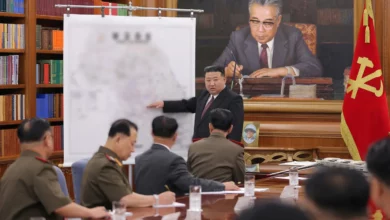Ramallah, West Bank–US peace envoy George Mitchell had "serious and positive" talks on Tuesday with Palestinian President Mahmoud Abbas, but there was no agreement on a move to direct negotiations with Israel.
"We are continuing our efforts to reach a formula that will help us launch serious negotiations, final negotiations, with a defined time frame, a defined agenda," Chief Palestinian negotiator Saeb Erekat told reporters.
Palestinian sources said Abbas could decide "within days" whether to begin face-to-face peace talks with Israeli Prime Minister Benjamin Netanyahu, provided he received political backing for the move from major powers.
"The Americans showed understanding of the Palestinian position that we will go to direct talks on the basis of the March 19 Quartet statement," a Palestinian official said, referring to a statement issued by the four major powers involved in Middle East mediation.
Abbas said on Monday that if the Quartet — the United States, European Union, Russia and the United Nations — repeated the statement calling on Israel to halt settlement activities and reach a full peace agreement with the Palestinians within 24 months, then "I will immediately go to direct talks, because it includes everything I am asking for."
Sources involved with efforts to bring the sides together said Abbas would tell Mitchell this Sunday whether he was willing to return to direct talks, and that if his decision was positive, the Quartet would issue its statement on Monday or Tuesday, giving Abbas the international backing he seeks.
From a Palestinian point of view, agreeing to direct talks now could be seen at home as another unwarranted concession, further diminishing Abbas's dwindling political stature. A restatement of the Quartet's position would provide a fig-leaf.
Abbas hinted as much on Monday, saying: "We may face other pressures that we cannot endure (and) if that happens, I will study this thing with the leadership … and take the appropriate decision."
Arriving at Abbas' Ramallah presidential compound, the normally stern 76-year-old Mitchell, who has repeatedly heard "no" from both sides, wore a broad smile.
In a brief statement after the talks, the envoy confined himself to saying "we are continuing our efforts." Peace was "in the interests of the Palestinian people, the people of Israel and all the people of the region as well as in the national interest of the United States," he said.
The stalled peace process resumed in May after an 18-month hiatus, but only at the level of indirect "proximity talks," in which Mitchell acts as a shuttling, third-party diplomat.
US President Barack Obama has said he wants direct talks to resume well before 26 September, when a partial moratorium on Israeli settlement construction in the occupied West Bank is set to expire, with possibly dire consequences for the process.
Abbas insists that direct talks tackle all territory Israel has occupied since capturing it in the 1967 Middle East war. He means East Jerusalem, which Palestinians want as capital of their future state, and the Jordan Valley, which Israel might insist on continuing to secure with its own forces.
Abbas also wants an end to Israeli West Bank settlement.
Netanyahu says Abbas is wasting time, and insists the Palestinians can bring all of these issues to the table. He says he is ready to sit down to talks immediately.
Mitchell was due to see Netanyahu on Wednesday morning.




